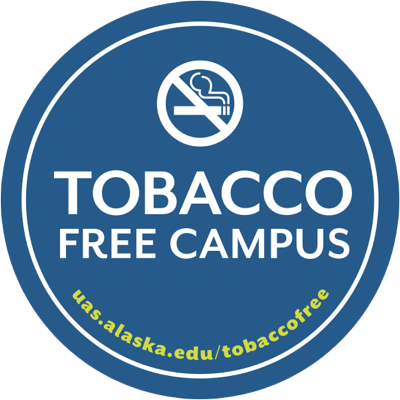Tobacco Policy
 UA Smoke-Free/Tobacco-Free Policy
UA Smoke-Free/Tobacco-Free Policy
The University of Alaska is committed to providing a safe and healthy environment for its students, employees, and visitors, by prohibiting tobacco use and smoking, including the use of electronic cigarettes and similar products, within its campuses and facilities.
Board of Regents Policy 05.12, paragraph 102.
Background
In December 2014, the University of Alaska Board of Regents voted to implement a tobacco-free policy across all campuses in the UA system. UAS is tobacco free as of July 1, 2015.
Regulation
Smoking and the use of all tobacco and tobacco-related products are prohibited within all university real property, buildings, and vehicles. Littering an area with, or with the remains of, tobacco-related or smoking-related products is also prohibited. Smoking or the use of tobacco products is allowed in personally owned vehicles parked or being driven on campus and on public sidewalks or public rights-of-way that border campus.
Implementation of this policy will rely on the consideration and cooperation of the entire university community to share the responsibility of adhering to and encouraging compliance. For suggestions on how to communicate the policy repectfully, please consult the following toolkits:
Use of marijuana as an inhalable burning substance is prohibited. Any use also is prohibited by federal law, other university regulations and the student conduct code.
As a recipient of federal funds, UAS must comply with the Safe and Drug-free Schools and Communities Act and the Drug-Free Workplace Act. So too must university employees.
The use of tobacco products allowed in personally owned vehicles parked or being driven on the campus. You can also smoke on public sidewalks and public rights-of-way that border a campus. Contractors may smoke 50 feet inside a fenced construction project in which the contractor has complete custody.
The policy does not prohibit tobacco use while inside personal vehicles; however, cigarette butts should be disposed of properly. For other exclusions from the ban, please refer to the smoke-free/tobacco-free campuses regulation.
If you are an employee looking for information to help you kick the tobacco habit, visit the University of Alaska's tobacco cessation website.
If you’d like information to help you to kick the tobacco habit and you are a student, please visit UAS’s Health Clinic/Student Resource Center. You can also find more resources by calling the Alaska Tobacco Quit Line at 1-800-QUIT-NOW or by visiting their website.
Concerns about the use of tobacco and related products should be expressed respectfully. You should courteously inform the individual about the policy and encourage him or her to comply.
Please recognize that the change may be difficult for some people. It’s important that you share the policy information in a non-confrontational manner.
Possible approach:You may not be aware that the university adopted a smoke-free/tobacco-free campus regulation recently. The regulation prohibits use of any inhalable burning substances and all smokeless tobacco and tobacco-containing products. Use is only allowed in personal vehicles. Everyone is expected to follow the policy. If you have questions, you can visit the website at uas.alaska.edu/tobaccofree
Implementation of this prohibition relies heavily on the consideration and cooperation of both smokers and nonsmokers, and the willingness of all members of the university community to share the responsibility of adhering to and enforcing the prohibition, and holding and of holding themselves and each other accountable. Whenever possible, concerns about tobacco and related product use should be respectfully addressed at the time such concerns arise, through respectfully informing the individual about the prohibition and encouraging compliance in a courteous and considerate manner.
Concerns regarding repeated violations of the policy or the regulation will be referred to the appropriate unit for review and action:
- Students — to the university student affairs representative.
- Faculty, staff and volunteers — to their supervisors.
- Contractors and vendors — to their employers and/or UAS Business Services.
Visitors and guests may be required to leave campus if they fail to conform to the policy or regulation.
Share the policy and explain that violating the tobacco-free campus regulation will be treated as any other violation of campus regulation. Consider sharing resources for employees who want help with quitting. While employees are permitted to use their regular breaks to use tobacco, they are not allotted additional break time.
If you have questions not answered here regarding employees and tobacco use, please contact Human Resources.
One of UAS’s top priorities is the safety and health of UAS students. All students who smoke will need to adhere to the policy.
More than 1,200 colleges and universities nationwide already have either a comprehensive smoke-free or tobacco-free policy. Health campuses in the U-Med District have a tobacco-free policy, such as Providence Alaska Medical Center, Alaska Native Medical Center, and Alaska Native Health Consortium.

Toolkits
- Student Toolkit for Communicating the Smoke-Free/Tobacco-Free Policy
- Employee Toolkit for Communicating the Smoke-Free/Tobacco-Free Policy
Alaska's Tobacco Quit Line
For more resources on quitting tobacco, visit Alaska's Tobacco Quit Line or call 1-800-QUIT-NOW.